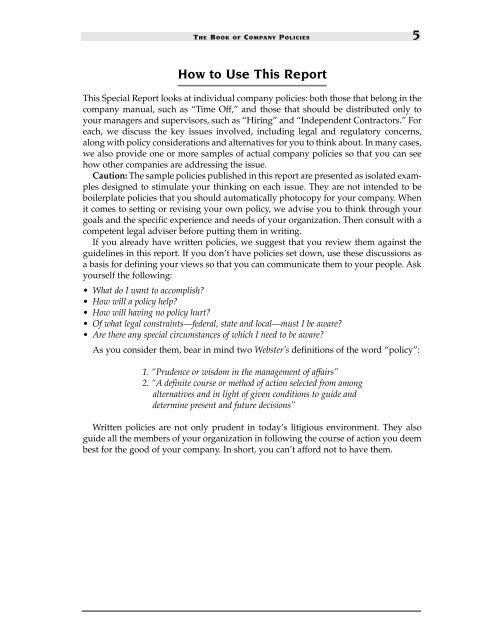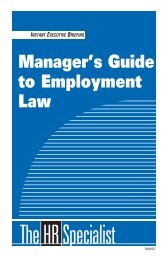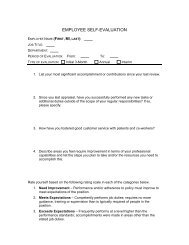sample policies
sample policies
sample policies
Create successful ePaper yourself
Turn your PDF publications into a flip-book with our unique Google optimized e-Paper software.
THE BOOK OF COMPANY POLICIES<br />
5<br />
How to Use This Report<br />
This Special Report looks at individual company <strong>policies</strong>: both those that belong in the<br />
company manual, such as “Time Off,” and those that should be distributed only to<br />
your managers and supervisors, such as “Hiring” and “Independent Contractors.” For<br />
each, we discuss the key issues involved, including legal and regulatory concerns,<br />
along with policy considerations and alternatives for you to think about. In many cases,<br />
we also provide one or more <strong>sample</strong>s of actual company <strong>policies</strong> so that you can see<br />
how other companies are addressing the issue.<br />
Caution: The <strong>sample</strong> <strong>policies</strong> published in this report are presented as isolated examples<br />
designed to stimulate your thinking on each issue. They are not intended to be<br />
boilerplate <strong>policies</strong> that you should automatically photocopy for your company. When<br />
it comes to setting or revising your own policy, we advise you to think through your<br />
goals and the specific experience and needs of your organization. Then consult with a<br />
competent legal adviser before putting them in writing.<br />
If you already have written <strong>policies</strong>, we suggest that you review them against the<br />
guidelines in this report. If you don’t have <strong>policies</strong> set down, use these discussions as<br />
a basis for defining your views so that you can communicate them to your people. Ask<br />
yourself the following:<br />
• What do I want to accomplish<br />
• How will a policy help<br />
• How will having no policy hurt<br />
• Of what legal constraints—federal, state and local—must I be aware<br />
• Are there any special circumstances of which I need to be aware<br />
As you consider them, bear in mind two Webster’s definitions of the word “policy”:<br />
1. “Prudence or wisdom in the management of affairs”<br />
2. “A definite course or method of action selected from among<br />
alternatives and in light of given conditions to guide and<br />
determine present and future decisions”<br />
Written <strong>policies</strong> are not only prudent in today’s litigious environment. They also<br />
guide all the members of your organization in following the course of action you deem<br />
best for the good of your company. In short, you can’t afford not to have them.
















